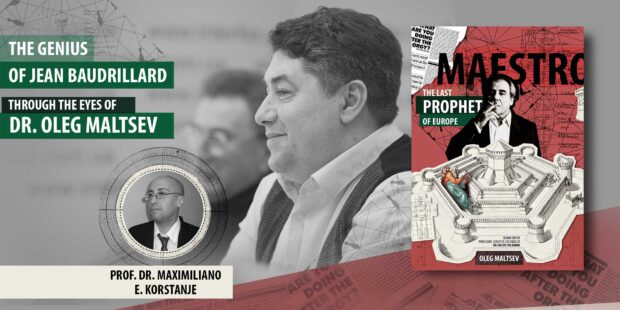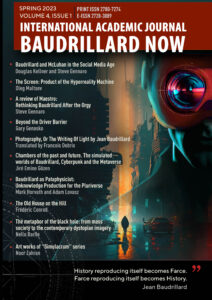
The genius of Jean Baudrillard through the eyes of Dr. Oleg Maltsev.
Review of Maestro. The Last Prophet of Europe
by Prof. Dr. Maximiliano E. Korstanje
Jean Baudrillard, doubtless, has been one of the greatest minds of the 20s century. His legacy sheds light on the modern social sciences alerting on the problems and challenges posed by society. Global capitalism, as well as the culture of simulacra, threatens to efface the individual identity whilst transforming human reciprocity into a type of exchangeable commodity. As stated, he is resisted and applauded by his colleagues. For some reason, his caustic critique against modern sociology as well as his deep analysis has been some of the factors that led some voices to deride Baudrillard. What is more important, Baudrillard discusses critically to what extent global modernism (as we know it today) effaces the concept of history and the real. Elegantly written by Oleg Maltsev (with a translation of Kanykei Tursunbaeva) Jean Baudrillard. Maestro: The Last Prophet of Europe situates as an interesting line of investigation that not only traces back to the main core of Baudrillard´s argumentation but also lays the foundations towards a new understanding of his genius. The book is structured in 16 chapters which so to speak can be read separately. Anyway, each chapter keeps a similar common-thread argument oriented to explain why Baudrillard is present even to date. In the introductory chapter, the author exposes his interests, main goals to write this book as well as centering efforts in deciphering Baudrillard´s studies.
Baudrillard, without any doubt, is the philosopher who interrogates directly the status quo. Not only does he defies (enhances) the classic concept of alienation in Marxism, but also proposes something new. The western market economies have successfully expanded whilst threatening to destroy the meaning of production itself. Having said this, as Professor Maltsev puts it, Baudrillard is not strictly limited to analyzing capitalism but to introducing an all-encompassing theory of the man. Whereas capitalism only speaks of the inevitable interplay between models of productions, mankind reflects the concept of divinity. As Baudrillard explains, the problem of the people is the people themselves. The notion of the real mutates radically simply because science cannot distinguish good from bad knowledge. Here is where the concept of hyperreal surfaces.
The book can be read in two parts, the first one adapted to introduces readers to the Baudrillard studies which means his preliminary insights associated with the concept of hyper-real, the epistemological crisis of science more interested in protecting the interests of the global stakeholders than in understanding reality, and the re-construction for a new method in social science. This part includes from second to ninth chapters. The second part (formed by the rest of the book) discusses the notion of radical anthropology. As a good ethnographer, Baudrillard intersects Freudian psychoanalysis with the radical analysis of Nietzsche. At a closer look, he is strongly interested to describe the philosophy of the discipline, not echoing Foucault, but on the principle of reversibility. At the time some construction is growing, it is self-destroying. The concept of reversibility occupies a central position in Baudrillard´s mind and of course, gives a fresh insight to scrutinize one of the paradoxical situations of sociology today. Science does not explain anything, as he eloquently observes, science is simply designed to confirm the circularity of capital, which means the possibility for organizing efficiently information to resolve problems of the market. In this vein, it is safe to say education never questions the ideological disposition of the ruling elite but accepts them as business as usual. This leads to holding in several parts of his text, America and Western civilization not only are irrational but also illiterate. We are formatted to read some pages but at the time we do it, we do not stop in the punctuation. Whilst remembering the great tragedies that whipped mankind in former centuries, we forget them.
It is important not to lose sight of fact that scientists do not blame persons or responsible persons for what happens, in the name of objectivity, scientists replicate the conditions of phenomenon demonstrating the issue as a whole. Lay-people are blamed (questioned) by the elite, leaving their trust in scientific indicators. Science explains the world whilst legitimating politics. Last but not least, Baudrillard contradicts Beck´s society of risk simply because risks are social construes that opens the doors to the future. In the future, nothing happens as it is imagined. An economy based on risk seems to be an economy mainly marked by the simulacra, and the pseudo-events. This reminds the film Minority Report where police supported by Precogs visualize future crimes before they are committed. As result potential criminals are arrested earlier the crime is perpetrated. This is like the pseudo-events ultimately work. Science marks the way of events that never happen. This leads Baudrillard to hold the polemic thesis “the gulf did not take place”. Most certainly, Baudrillard may be equated and put in dialogue with other great minds such as Jacques Ellul, Paul Virilio, Zlavoj Zizek and Jacques Ranciere.
At least for this review, the present book which entitles Maestro: The Last Prophet of Europe, well-written by Oleg Maltsev exhibits an accurate analysis of Baudrillard´s approaches as well as the large dimension of his legacy. A must-read book highly recommended for social scientists, writers, and laypeople interested in the contradictions of modernity and politics.
Discover more from BAUDRILLARD NOW
Subscribe to get the latest posts sent to your email.


